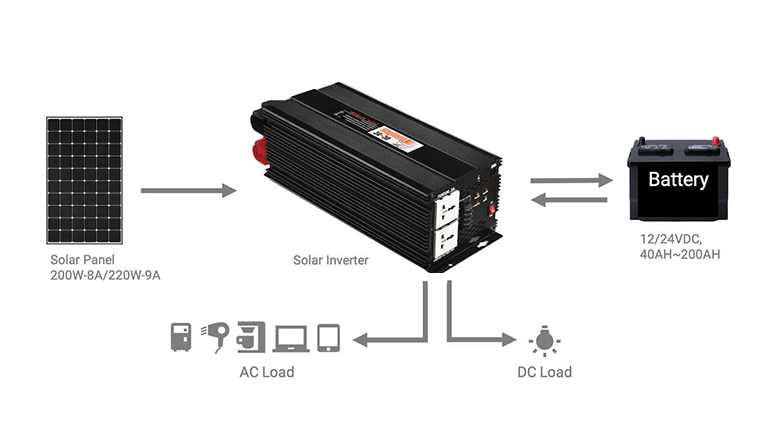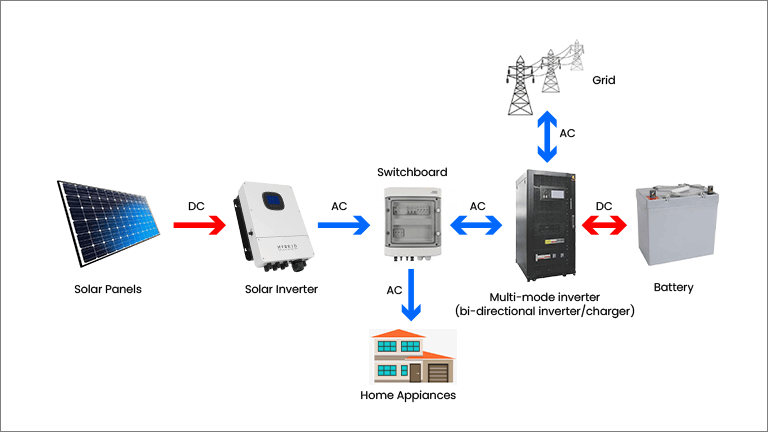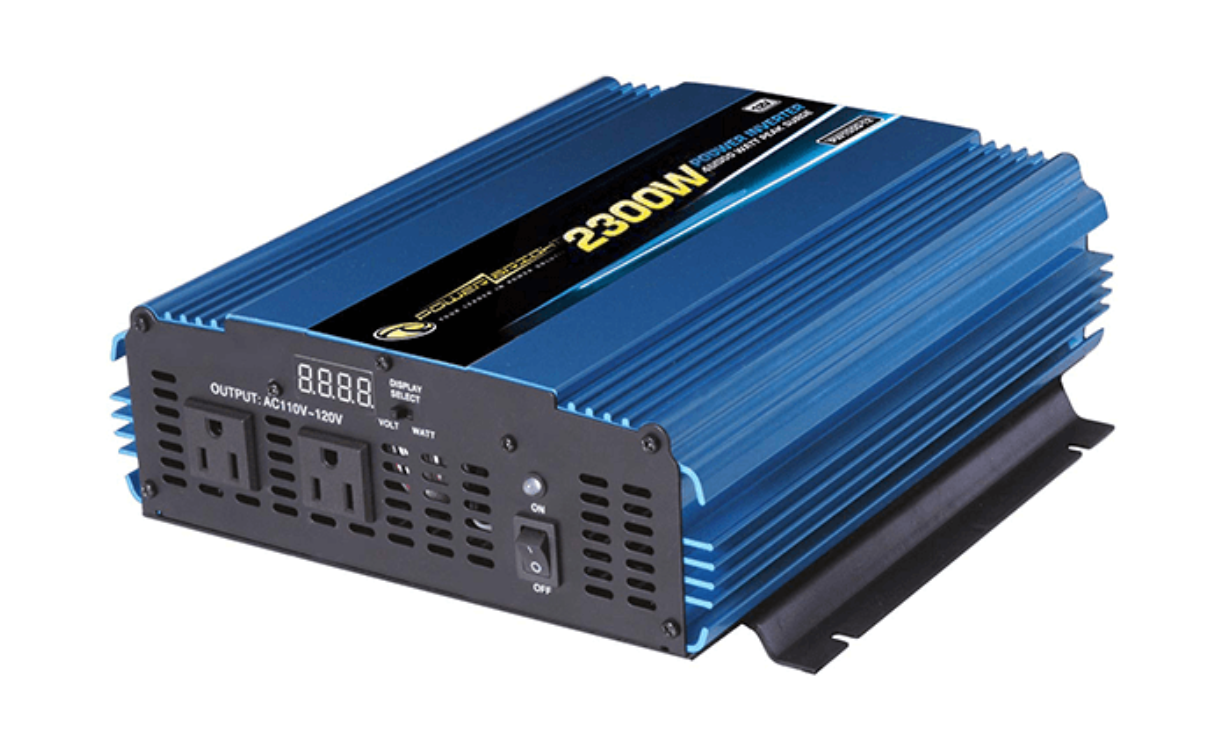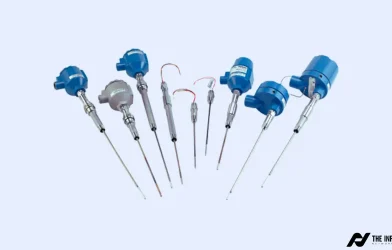DC to AC Inverter for Lower Electric Bills
A DC to AC inverters works by converting the direct current (DC) from solar panels into alternating current (AC). For utilizing solar energy, you depend less on the grid, lowering your electricity bills.
In this article, we will learn what a DC to AC inverter is, how it works and saves money.
What is a DC to AC Inverter?
A DC to AC inverter is a device that changes direct current electricity into alternate current electricity.
Direct Current (DC) is the type of electricity that flows in one direction. When you charge your phone or use a flashlight, you are using devices powered by DC. Batteries, solar panels, and fuel cells produce DC electricity.
Alternating Current (AC) is the type of electricity that changes direction periodically. AC electricity allows electricity to travel longer distances without losing energy. AC powers most homes and businesses. The electricity that comes from your wall is AC power.
How Does DC to AC Inverters Work?
When you generate electricity using a solar panel or other renewable sources, you get DC electricity. However, most of your household appliances, like refrigerators, microwaves, and televisions, use AC electricity. This is where the DC to AC inverter comes into play.

The inverter takes the DC electricity and converts it into AC electricity. Here’s a simple breakdown of how this process works:
- Input Voltage: The inverter receives DC voltage from a battery or solar panel.
- Inversion Process: Inside the inverter, there are electronic components that switch the DC voltage on and off rapidly. This switching action creates an alternating current output that mimics the AC power supplied by the grid.
- Output Voltage: The inverter then sends this AC power to the battery and your home’s electrical system to use your appliances without any issues.
How a DC to AC Inverter Can Save You Money
Now that we understand what a DC to AC inverter is and how it works, let’s look at how it can help you save money on your energy bills.

1. Utilize Solar Energy Effectively
DC to AC inverters allows you to use solar energy effectively. Solar panels generate DC electricity. A DC to AC inverter converts this energy into AC power to use this renewable energy for your appliances which reduces your dependence on your utility company and lowers your energy bills.
2. Decrease Dependence on Grid Electricity
Relying only on traditional electricity from the grid means being a victim to fluctuating energy prices. A DC to AC inverter converts solar energy. It significantly decreases your dependence on grid electricity. Whenever the energy prices rise, you continue to save money by generating your own power.
3. Reduce Energy Loss
AC to DC power results in energy loss whereas a DC to AC inverter is specifically designed to be efficient to minimize energy waste during conversion. By using an efficient inverter, you ensure that more of the electricity generated reaches your appliances which helps to keep your bills lower.
4. Backup Power Supply
DC to AC inverters provides backup power In case of power outages. Connecting your inverter to a battery bank ensures your usage of stored DC electricity to run essential devices like your refrigerator, lights, and heating systems. This can save you from food spoilage and the cost of alternative power sources during an outage.
5. Increase Appliance Lifespan
Using a DC to AC inverter ensures that your appliances receive a stable power supply. This can reduce wear and tear on your devices, prolonging their lifespan. When appliances last longer, you save money on repairs or replacements, which contributes to overall savings.
6. Choose the Right Size Inverter
When selecting a power inverter DC to AC, it’s essential to choose one that fits your power needs. A correctly sized inverter will be more efficient and reduce energy costs. If you buy an inverter that is too small, it may struggle to keep up with demand, leading to inefficiencies. If it’s too large, you may waste energy. Assess your energy usage and select an inverter that matches your requirements.
7. Flexibility for Off-Grid Living
For those living off the grid, a DC to AC inverter is invaluable. It allows you to use solar panels or wind turbines to power your home. This independence from the grid means no monthly electricity bills, making it a cost-effective solution in the long run.
8. Environmentally Friendly Savings
Using a DC to AC inverters to harness renewable energy sources like solar power not only saves you money but also helps the environment. By reducing your reliance on fossil fuels and decreasing your carbon footprint, you contribute to a more sustainable planet. Many people find that saving the environment while saving money is a significant motivating factor.
Advantages & Disadvantages of Using DC to AC inverters
Advantages:
- Saves on energy bills by using renewable sources.
- Provides backup power during outages.
- Eco-friendly and reduces carbon footprint.
- Powers various devices effectively.
- Maximizes energy use from renewable sources.
Disadvantages:
- High initial cost for a quality inverter.
- Needs regular maintenance for optimal performance.
- Limited power output for larger devices.
- Produces noise during operation.
- Energy loss in conversion from DC to AC.
AC to DC Inverter vs DC to AC Inverter
While discussing inverters, it’s important to understand the difference between an AC to DC inverter and a DC to AC inverter. Here’s a quick comparison:
- AC to DC Inverter: This device converts AC power into DC power. It is often used for charging batteries or powering devices that require DC electricity.
- DC to AC Inverter: This inverter converts DC power (like that from solar panels or batteries) into AC power, which is necessary for powering household appliances.
For saving on electric costs, a DC to AC inverter is generally the better choice. If you’re looking to maximize energy savings and use renewable energy efficiently, investing in a DC to AC inverter is the way to go!
Conclusion
A DC to AC inverter is a valuable tool for saving money on your energy bills. By converting solar energy into usable power for your home, it reduces reliance on the grid and lowers electricity costs. Whether for renewable energy systems or backup power, investing in a DC to AC inverter can lead to significant savings and a more sustainable energy future.









Hasan Ahmed
Its Very informative Article